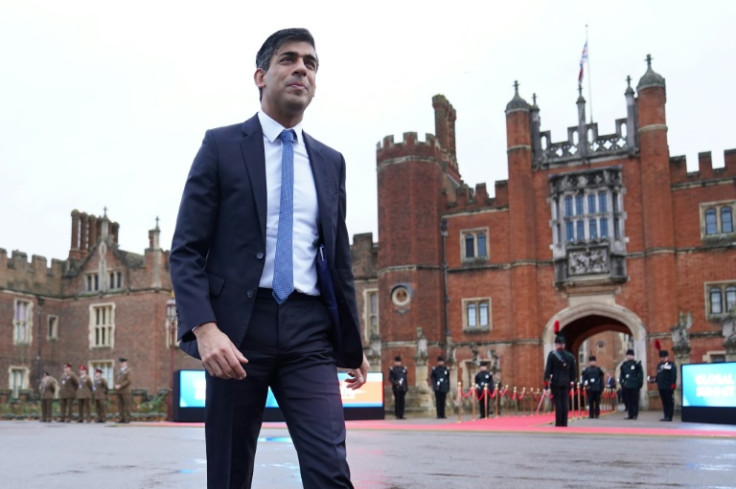Sunak Accused of Misrepresenting UK Climate Aid Ahead of COP28 Attendance
Charities and NGOs accuse the government of changing how it calculates climate spending to claim it will exceed targets.

As Chancellor Rishi Sunak prepares to attend the 28th Conference of the Parties (COP28) on climate change, criticism mounts over accusations that his recent policy decisions are sending mixed signals in the fight against the climate crisis.
Concerns are being raised about the UK's commitment to sustainability and environmental responsibility as Sunak heads to the global summit.
The prime minister is set to allocate approximately £1.6 billion in climate finance during the summit, asserting that the UK will surpass its goal of expending £11.6 billion over the five-year period leading up to 2026.
The controversy revolves around several decisions made by the Chancellor that some environmental advocates argue undermine the country's climate ambitions.
However, he is facing allegations from charities and non-governmental organisations that the UK is set to achieve the target only by altering the methodology for calculating climate aid, potentially falling significantly short of the overall goal.
Leading up to the summit, Sunak underscored his "pragmatic" approach to addressing the climate crisis, a stance that follows his recent decision to dilute the net-zero targets for phasing out petrol cars and gas boilers.
Speaking on Thursday, he expressed: "The transition to net zero should enhance our safety and prosperity. It must be advantageous, not burdensome, for ordinary families.
"The UK has been a trailblazer in making pragmatic, long-term decisions domestically, and at COP28, we will spearhead international initiatives to safeguard the world's forests, accelerate renewable energy, and mobilise the full force of private finance."
Additionally, Sunak asserted that ambitious commitments to cap global warming at 1.5 degrees are sufficient, declaring that "the time for pledges is now over – this is the era for action".
Sunak emphasised: "I'm not beholden to ideological zealots on this topic. While achieving net zero is undoubtedly crucial, we can pursue this goal in a sensible manner that not only saves people money but also avoids burdening them with additional costs."
Critics argue that reducing financial support to vulnerable countries contradicts the UK's pledge to contribute to global climate resilience and adaptation efforts.
The accusation gains traction as climate experts emphasise the interconnectedness of climate action with international aid, especially in regions most vulnerable to the impacts of climate change.
Ahead of the summit, Sunak asserted that the UK stands as a "world leader when it comes to climate", citing statistics to support the claim of outpacing other nations in meeting environmental commitments.
Notably, No 10 announced that the prime minister would allocate £1.6 billion of climate finance for projects, with nearly £900 million, including £465 million for forests, constituting new funding separate from the £11.6 billion spending target spanning 2022 to 2026.
The UK is also contributing around £60 million to a global loss and damage fund revealed in Dubai, drawing criticism from ActionAid, which deemed it a "derisory offer to millions of people facing climate catastrophe".
The government faces accusations of altering the definition of international climate finance to meet the £11.6 billion target.
Over 70 UK civil society organisations wrote to Sunak in October challenging the new definition, with Climate Action Network UK asserting that "changing the goalposts is not a credible or appropriate way for the UK to meet its international commitments".
Historically, wealthy nations committed to providing financial assistance, in the form of loans or cash, to help poorer countries reduce greenhouse gas emissions and cope with the repercussions of the climate crisis.
However, leaks in the summer indicated that UK ministers were significantly off track in meeting their targets, potentially achieving them only by diverting funds from the aid budget.
The government contends that its revised definition represents a "clarification" of how the money is spent rather than an attempt to manipulate the figures.
The upcoming COP28, scheduled to take place at a critical juncture for global climate efforts, adds significance to the need for coherent and decisive policies from participating nations.
Sunak's role as a representative of the UK places him at the centre of attention, with expectations for clear signals of the country's dedication to sustainability.
As the Chancellor heads to COP28, the debate surrounding his policy decisions underscores the complex interplay between economic considerations and environmental responsibilities.
The outcomes of the summit will likely influence perceptions of the UK's commitment to tackling the climate crisis, making it crucial for Sunak to address concerns and articulate a cohesive strategy that aligns with global expectations for climate leadership.
© Copyright IBTimes 2025. All rights reserved.






















